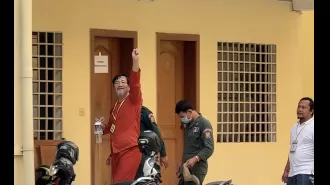The United Nations has ruled that Israel must stop its military action in Rafah.
Israel won't obey, but will increase pressure on isolated country.
May 24th 2024.

On Friday, the top United Nations court issued a direct order for Israel to cease its military operations in Rafah, a city in southern Gaza. However, it is unlikely that Israel will comply with this order, which will only increase the mounting pressure on the already isolated country.
Criticism of Israel's actions in the ongoing Gaza war has been steadily growing, even from its closest ally, the United States. The US has warned against an invasion of Rafah, where hundreds of thousands of Palestinians have sought refuge from the violence in other areas.
In the past week alone, three European countries have recognized a Palestinian state, and the chief prosecutor for another UN court has requested arrest warrants for both Israeli and Hamas leaders. Israeli Prime Minister Benjamin Netanyahu is facing immense pressure from his own country to end the war, which was sparked by a militant attack that resulted in the deaths of 1200 people, mostly civilians, and the capture of 250 hostages.
Thousands of Israelis have taken to the streets in weekly demonstrations, calling on the government to secure the release of the hostages before it's too late. While the ruling by the International Court of Justice is a significant blow to Israel's international reputation, the court does not have the power to enforce its orders. This is evident in another case on its docket, where Russia has ignored a 2022 order to halt its invasion of Ukraine.
Israel has also indicated that it will not comply with the ICJ's order to cease operations. Avi Hyman, the government spokesperson, made it clear that, in their view, nothing would stop Israel from protecting its citizens and pursuing Hamas in Gaza.
The ruling was delivered by the court's president, Nawaf Salam, while a small group of pro-Palestinian protesters demonstrated outside. The court expressed concerns about the situation in Rafah, stating that the fears expressed earlier had unfortunately become a reality, and the humanitarian situation there was now disastrous.
However, the court did not go as far as South Africa, who had requested a full ceasefire throughout Gaza. This was part of a case filed by South Africa last year, accusing Israel of genocide during its Gaza campaign. While the case will take years to resolve, South Africa is seeking interim orders to protect Palestinians while the legal process continues.
At public hearings last week, South Africa's ambassador to the Netherlands urged the court to order Israel to withdraw completely and unconditionally from Gaza. The court has already acknowledged the real and imminent risk that Israel's military operations pose to the Palestinian people in Gaza.
According to Gaza's Health Ministry, which does not differentiate between combatants and civilians, the offensive has resulted in the deaths of over 35,000 Palestinians. Entire neighborhoods have been destroyed, and hundreds of thousands of people have been forced to flee their homes, with parts of the territory now facing famine.
For South Africa's legal team, this may be their last chance for the court to take action. However, Israel has rejected the claims, stating that they take extraordinary measures to minimize harm to civilians in Gaza.
In January, the ICJ ordered Israel to do everything in its power to prevent death, destruction, and any acts of genocide in Gaza. However, the court stopped short of ordering an end to the military offensive. In a second order in March, the court mandated that Israel must take steps to improve the humanitarian situation.
It's important to note that the ICJ rules in disputes between nations, while the International Criminal Court deals with individual cases of war crimes, crimes against humanity, and genocide. The ICC's chief prosecutor, Karim Khan, has requested arrest warrants for Netanyahu, Defence Minister Yoav Gallant, and three top Hamas leaders, including Yahya Sinwar, Mohammed Deif, and Ismail Haniyeh, for their roles in war crimes and crimes against humanity in both Gaza and Israel.
Although Israel is not a member of the ICC, the threat of arrest warrants could make it difficult for these leaders to travel abroad. For the latest updates on this and other breaking news, celebrity, and sports news, follow us on our WhatsApp channel. Our platform offers a safe space for you to stay informed without any comments or algorithms, and your private details remain secure.
Criticism of Israel's actions in the ongoing Gaza war has been steadily growing, even from its closest ally, the United States. The US has warned against an invasion of Rafah, where hundreds of thousands of Palestinians have sought refuge from the violence in other areas.
In the past week alone, three European countries have recognized a Palestinian state, and the chief prosecutor for another UN court has requested arrest warrants for both Israeli and Hamas leaders. Israeli Prime Minister Benjamin Netanyahu is facing immense pressure from his own country to end the war, which was sparked by a militant attack that resulted in the deaths of 1200 people, mostly civilians, and the capture of 250 hostages.
Thousands of Israelis have taken to the streets in weekly demonstrations, calling on the government to secure the release of the hostages before it's too late. While the ruling by the International Court of Justice is a significant blow to Israel's international reputation, the court does not have the power to enforce its orders. This is evident in another case on its docket, where Russia has ignored a 2022 order to halt its invasion of Ukraine.
Israel has also indicated that it will not comply with the ICJ's order to cease operations. Avi Hyman, the government spokesperson, made it clear that, in their view, nothing would stop Israel from protecting its citizens and pursuing Hamas in Gaza.
The ruling was delivered by the court's president, Nawaf Salam, while a small group of pro-Palestinian protesters demonstrated outside. The court expressed concerns about the situation in Rafah, stating that the fears expressed earlier had unfortunately become a reality, and the humanitarian situation there was now disastrous.
However, the court did not go as far as South Africa, who had requested a full ceasefire throughout Gaza. This was part of a case filed by South Africa last year, accusing Israel of genocide during its Gaza campaign. While the case will take years to resolve, South Africa is seeking interim orders to protect Palestinians while the legal process continues.
At public hearings last week, South Africa's ambassador to the Netherlands urged the court to order Israel to withdraw completely and unconditionally from Gaza. The court has already acknowledged the real and imminent risk that Israel's military operations pose to the Palestinian people in Gaza.
According to Gaza's Health Ministry, which does not differentiate between combatants and civilians, the offensive has resulted in the deaths of over 35,000 Palestinians. Entire neighborhoods have been destroyed, and hundreds of thousands of people have been forced to flee their homes, with parts of the territory now facing famine.
For South Africa's legal team, this may be their last chance for the court to take action. However, Israel has rejected the claims, stating that they take extraordinary measures to minimize harm to civilians in Gaza.
In January, the ICJ ordered Israel to do everything in its power to prevent death, destruction, and any acts of genocide in Gaza. However, the court stopped short of ordering an end to the military offensive. In a second order in March, the court mandated that Israel must take steps to improve the humanitarian situation.
It's important to note that the ICJ rules in disputes between nations, while the International Criminal Court deals with individual cases of war crimes, crimes against humanity, and genocide. The ICC's chief prosecutor, Karim Khan, has requested arrest warrants for Netanyahu, Defence Minister Yoav Gallant, and three top Hamas leaders, including Yahya Sinwar, Mohammed Deif, and Ismail Haniyeh, for their roles in war crimes and crimes against humanity in both Gaza and Israel.
Although Israel is not a member of the ICC, the threat of arrest warrants could make it difficult for these leaders to travel abroad. For the latest updates on this and other breaking news, celebrity, and sports news, follow us on our WhatsApp channel. Our platform offers a safe space for you to stay informed without any comments or algorithms, and your private details remain secure.
[This article has been trending online recently and has been generated with AI. Your feed is customized.]
[Generative AI is experimental.]
0
0
Submit Comment





